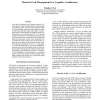Free Online Productivity Tools
i2Speak
i2Symbol
i2OCR
iTex2Img
iWeb2Print
iWeb2Shot
i2Type
iPdf2Split
iPdf2Merge
i2Bopomofo
i2Arabic
i2Style
i2Image
i2PDF
iLatex2Rtf
Sci2ools
146
click to vote
COGSR
2011
2011
Reactive goal management in a cognitive architecture
Goals play an important role in human cognition. Different aspects of human mind influence the generation of goals they pursue, and the goals guide their behaviors. In psychology, researchers made significant efforts to study goals and their origin, and cognitive architectures include various facilities to handle the goals of artificial agents. One such architecture, ICARUS, supports goal-driven behaviors while maintaining reactivity, and its top-level goals play an important role of guiding the behavior of the agents. However, the architecture covers neither the origin of its top-level goals nor the dynamic aspects of them, and this imposes various restrictions like limited autonomy on ICARUS. In this paper, we extend the architecture to provide the capability to nominate top-level goals using the notion of long-term, general goals, and manage the nominated goals by prioritizing them. For prioritization of goals, we introduce a novel capability to match concepts in a continuous ma...
Related Content
| Added | 13 May 2011 |
| Updated | 13 May 2011 |
| Type | Journal |
| Year | 2011 |
| Where | COGSR |
| Authors | Dongkyu Choi |
Comments (0)

